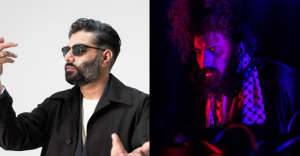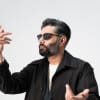On Friday, Himanshu Suri, aka rapper Heems, appeared at London's School Of Oriental and African Studies for an event called The Policing Of Brown Bodies Post-9/11, hosted by the university's Decolonising Our Minds society.
Heems, who released his debut solo album Eat Pray Thug in March and founded Das Racist in 2008, began by giving a 30-minute lecture on police brutality, the prison industrial complex, classist attitudes around mental health issues and his own personal experiences and feelings surrounding all of the above. Overall, he addressed what he called the issue of "South Asian American apathy." "Indians don't and never will have it as hard as African-Americans, and even Latinos in America," he argued, later continuing: "If there was ever a time to stick together it's now. This time, with intense American police brutality, would be another one of those times where we should assist our black brothers and sisters."
Afterwards, the floor was opened to discussion, at which point a female audience member approached the stage to take the mic and say to Suri: "I was at your show on Tuesday...the crowd was about 50% white, 50% south Asian, and then a few black people, and you thought it was okay to be on that stage and address this audience and the black people on the stage, with the term 'bitch ass nigga.' Can you explain what the hell that was about?" This question continued a conversation that sparked on Twitter in May.
Heems responded: "I don't advocate for the use of South Asians to use that word...If anything, I've made enough music over the past five years, whatever—100, 150 songs—where I've never used the word."
"I have a problem with drugs and substance abuse, where when I become who I was when I was 15, because I started drinking around that age, I turn back into the type of kid I was in the neighborhood I was in, with the kids I grew up with, who spoke a certain way. Whatever you want to call it, associative aggression or whatever," he continued. "I try my best not to ever act like that...I try to make sure that for one, I only use that word around my friends, it's preceded by 'my,' it's a term of endearment. It's never around white people who feel comfortable that they can use it. But when I'm hanging out with my brothers, people who understand me real well—and I'll even say straight up, 'Hey, if this is something that offends you, I'll stop.' [An audience member yells 'stop.'] No, that's a valid point, and it's something that I work on every day. I'm not going to come up here and act like that's okay. But that's something I struggle with, and we've all got things we struggle with. But y'all aren't on the internet...so it's different for you."
Later, he apologized. "I always say that New Yorkers especially, we grew up with Dominican blacks, not black people in America who have dealt with issues in the south, where racism is really real, where that word has a real significance. Northern Americans especially shouldn't use that word, because they didn't feel the same thing as southerners," he said. "I try not to use that word, when I use it I use it as a term of endearment, never negativity. Nonetheless, I shouldn't use the word. But I promise you, I only use that word around my friends who find it as a term of endearment, and if they ever didn't, we would have a talk where I would stop. And I try to stop...I'm sorry."
The room's atmosphere had at this point become increasingly hostile. A few more people took to the stage to talk to Heems about their feelings surrounding his use of the N-word, and why they believe he should stop. One woman told him, "Your whole talk was about solidarity. It was about you being there for me, me being there for you, recognizing the differences and how we're played off against each other. And at the drop of a hat, with that word, what you do is you show me the difference. You show me how the cards are stacked, when you can choose to be down, and when you can choose to be not. And you blow the room apart. If it's about us constantly having to remind ourselves that we need to be together to fight this, that word needs to come out of your lexicon. You are an intelligent person. You've given an amazing talk. You don't need it. And what I've seen happen in this room, since that word flurried around this room, is division." Heems told her, "I agree 100% with everything you've just said."
The open discussion continued for 30-40 minutes, with the conversation briefly turning to Heems' music in general. Heems apologized for "appropriating an artform," adding jokily "but I don't know what to do, because I'm good at rapping."
The FADER reached out to Heems; the request for comment was not immediately returned. For more on Heems' new work and thoughts on identity, read his recent FADER interview.


